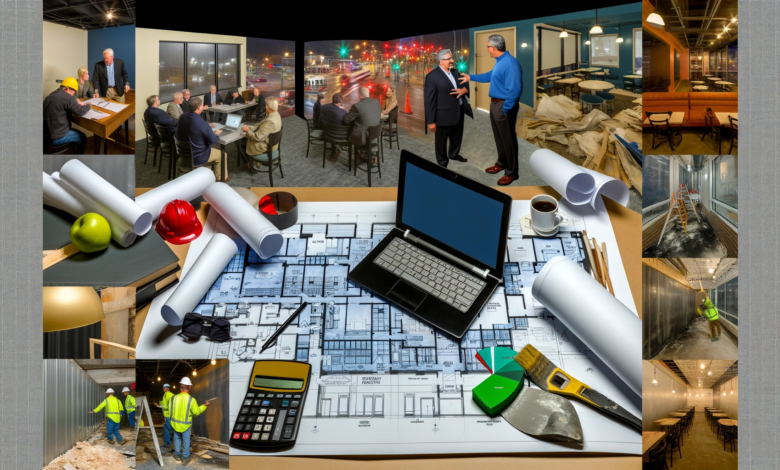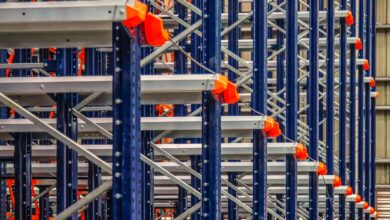Upgrade Your Retail Space: A Comprehensive Guide to Industrial Fitouts and Shop Transformations

In today’s fast-paced retail environment, providing an engaging and feasible area is critical for drawing consumers and increasing sales. Converting industrial sites into dynamic retail locations can be challenging. With the correct concept and leadership, industrial fitouts, especially shop fitouts, have the potential to transform these spaces into bustling commercial hubs. This extensive resource will cover everything you need about industrial fitouts and how they can transform retail spaces.
Understanding Industrial Fitouts: What Makes Them Different
Industrial fitouts transform industrial structures or locations into retail outlets, combining practicality and elegance to develop distinctive, inviting settings. Unlike standard retail fitouts, industrial fitouts frequently include raw and harsh components like bare masonry, steel supports, and concrete flooring, which lend style and appeal to the area. By retaining these industrial qualities while incorporating current design elements, industrial fitouts provide a unique mood that distinguishes them from traditional retail environments.
The Significance of Shop Fitouts: Improving the Retail Experience
Shop fitouts are essential in converting raw industrial buildings into valuable and attractive retail environments. Shop fitouts create and construct retail fittings, screens, and designs suited to the business’s demands and identity. From planning the layout and interior design to fixture decisions and signage setup, every part of the shop fitout is meticulously studied to improve the shopping experience for consumers and staff members.
Essential Factors for Industrial Shop Fitouts: Where to Start
Before starting an industrial shop fitout undertaking, several crucial aspects that will impact the area’s design and implementation must be remembered. This step entails evaluating the industrial building’s distinguishing features, such as design, dimensions, and solidity, and analyzing the retail business’s customer base and personality. In addition, budgetary constraints, scheduling, and legal demands must all be considered to guarantee an excellent outcome. Businesses may prevent expensive failures in their industrial shop fitout project by doing rigorous research and preparation ahead of time.
Design for Efficiency and Circulation: Creating an Accessible Retail Environment
One key objective of an industrial shop fitout is to design an aesthetically pleasing and functional retail area. This step entails carefully planning the area’s structure, circulation, and organization to enhance consumer mobility and product visibility. Businesses can use strategically placed fittings, exhibits, and signs to direct customers through the retail space rationally and straightforwardly, promoting product discovery and involvement. Incorporating adaptable and modular design features also enables easy adaptability to evolving requirements and offers throughout the year, maintaining the retail space’s lifespan and versatility.
Combining Industrial Elegance with Contemporary Convenience: The Craft of Blending
One of the distinguishing characteristics of industrial fitouts is their capacity to combine industrial charm with contemporary comforts and facilities effortlessly. This mix of raw, mechanical components with elegant, modern architectural accents creates an exciting and visually appealing retail atmosphere that catches customers’ attention. From recycling industrial relics as decor to implementing innovative technologies for effortless transactions and engaging interactions, industrial store fitouts achieve the ideal equilibrium between nostalgia and creation, making them an appealing destination for consumers.
Resilience and Ecological Accountability: A Rising Necessity
Durability and ecological responsibility are becoming important factors in industrial fitout projects as the globe becomes more environmentally conscious. Businesses want to lower their carbon footprint and waste by including renewable resources, cost-effective appliances, and ecologically conscious procedures in their store fitouts. This resource could involve using salvaged or repurposed materials, installing energy-efficient lighting and air conditioning units, and carrying out activities like collecting rainwater and garbage recycling. Businesses prioritising durability in their industrial fitouts showcase their dedication to ecological conservation while appealing to a rising category of environmentally concerned consumers.
Cultivating Brand Identity: Integrating Personality into Industrial Spaces
One of the most critical factors in commercial fitouts, especially shop fitouts, is matching the design to the company’s corporate identity and culture. Whether a boutique fashion retailer or a specialized electronic store, its aesthetic components should reflect the company’s values and beliefs, resulting in a unified and memorable consumer experience. This component may include adding brand colours, logos, and pictures into the overall layout and conceptual aspects relevant to the brand’s story and objective. Businesses may develop brand loyalty by instilling individuality and character in their spaces.
Developing Multi-functional Spaces: Versatility in Today’s Retail Landscape
Due to changing consumer tastes and market conditions, industrial fitouts increasingly incorporate multipurpose rooms that serve several uses other than traditional retail. From pop-up shops and community events to interactive retail encounters and co-working environments, industrialized retail locations are evolving into vibrant concentrations of activity and invention. Businesses can optimize the usability and earnings potential of their industrial shop fitouts by building versatile and adaptable facilities that can readily transition between multiple applications while remaining agile and sensitive to changing market needs.
Leveraging Technology: The Future of Industrial Shop Fitouts
Technology has become essential in industrial fitouts, changing how retailers interact with customers and handle business activities. From dynamic electronic displays and augmented reality experiences to portable point-of-sale devices and inventory management software, technology helps businesses provide personalised, effortless, and effective retail experiences that increase sales and customer loyalty. Industrial shop fitouts may keep ahead of the curve by integrating the newest technological developments and delivering innovative solutions that improve the retail experience while improving operational effectiveness and revenue.
Conclusion:
In conclusion, industrial fitouts offer endless possibilities for transforming raw industrial spaces into vibrant, dynamic retail environments that captivate, inspire, and engage. By embracing brand identity and connecting with the local community, industrial shop fitouts can unlock the full potential of their space and drive business success in today’s competitive retail landscape. So, if you’re considering an industrial fitout for your retail business, don’t hesitate to explore the opportunities and possibilities. With the right vision, creativity, and expertise, the sky’s the limit for what you can achieve with your industrial shop fitout.



